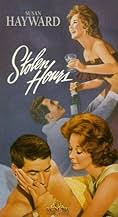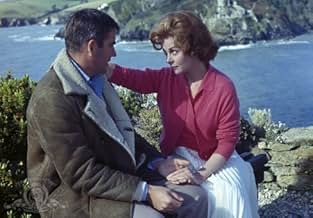Ajouter une intrigue dans votre langueDying English jet-setter marries her doctor and lives the best year of her life.Dying English jet-setter marries her doctor and lives the best year of her life.Dying English jet-setter marries her doctor and lives the best year of her life.
- Réalisation
- Scénario
- Casting principal
Richard Bebb
- Racetrack Official
- (non crédité)
Peter Evans
- Party Guest
- (non crédité)
Alex Graham
- Barman at Party
- (non crédité)
Pat Hagan
- Party Guest
- (non crédité)
Avis à la une
In an eerie foreshadowing of her own fate Susan Hayward plays a wealthy socialite with a fatal brain tumor in this reworking of Dark Victory.
The original is far superior but this has a lush production and some breath taking scenery of the Cornish coast, so beautiful you'll want to hop a plane and move there by the end of the picture, to recommend it.
Susie's customary strong performance is also a highlight but she doesn't get as deeply under the skin of the character of Laura Pember as Bette Davis did with Judith Traherne in the original.
Director Petrie doesn't have the artistic sensibilities of the original's Edmund Goulding so a certain tortured romantic feeling that was an underlying factor of the first film is missing from this.
Still for fans of Miss Hayward or plush dramas of the 50's-60's era this is an enjoyable way to pass a few hours.
In another ironic twist of fate Susan's next film was the tawdry but deeply satisfying Where Love Has Gone co-starring Bette Davis who was not pleased that Hayward had remade her personal favorite of her films. Bette stated before production had even begun "Some pictures SHOULDN'T be remade!!" surely stabbing the air with her omnipresent cigarette for emphasis. The two were cordial at the commencement of filming but soon set to squabbling over plot points and ended up more or less mortal enemies by the time the film was completed.
The original is far superior but this has a lush production and some breath taking scenery of the Cornish coast, so beautiful you'll want to hop a plane and move there by the end of the picture, to recommend it.
Susie's customary strong performance is also a highlight but she doesn't get as deeply under the skin of the character of Laura Pember as Bette Davis did with Judith Traherne in the original.
Director Petrie doesn't have the artistic sensibilities of the original's Edmund Goulding so a certain tortured romantic feeling that was an underlying factor of the first film is missing from this.
Still for fans of Miss Hayward or plush dramas of the 50's-60's era this is an enjoyable way to pass a few hours.
In another ironic twist of fate Susan's next film was the tawdry but deeply satisfying Where Love Has Gone co-starring Bette Davis who was not pleased that Hayward had remade her personal favorite of her films. Bette stated before production had even begun "Some pictures SHOULDN'T be remade!!" surely stabbing the air with her omnipresent cigarette for emphasis. The two were cordial at the commencement of filming but soon set to squabbling over plot points and ended up more or less mortal enemies by the time the film was completed.
Perhaps I am too much of a fan of Susan Hayward to be objective, but this film, which I saw when I was a nineteen-year-old sophomore in college, was one of the most memorable films I have seen. It was definitely a "chick flick" and my friends and I, needing a break from studying, went to see it only because there was nothing else playing. The film's emotional impact caught me off guard. I remember walking out of the theater after seeing the film. I recall walking into the damp San Jose, California night and feeling the pleasure ordinary sensations at a much more intense level - the cold fog against my face, the street lights reflected off of the wet streets, the sound of my footsteps on the sidewalk - the appreciation of each moment of life. Perhaps some would say Hayward was too old for the part. But Hawyard, as she had demonstrated over and over again (e.g. I Want to Live), could carry a film on the power of her acting. And at 45, she was still a knock out - even in the eyes of a 19-year old. Like many great actresses, she overacted. If you could accept it and allow her to draw you in, you could experience her character at a deeper emotional level than you would ever enjoy had she been held back by a director who did not appreciate her artistry. I highly recommend this film. I would, however, recommend that the film be viewed on a big screen. The cinematography is an important part of the film and it cannot be appreciated on a TV screen. Two other fabulous actresses did this story: Betty Davis in the original Dark Victory, and Elizabeth Montgomery in an excellent made-for-TV piece made, as I recall, in the 1980's. Both were fantastic. But I believe that you will find Susan Hayward's interpretation to be more compelling.
To get past Bette Davis' original star turn in this heart-tugging tale. Although I love Susan Hayward, she could not match the passion and authenticity Davis mastered. Hayward's, in comparison, comes off as pure melodrama. Wanted to manage a 7 rating for this, but 6 seems appropriate if only for the beautiful cinematography and stunning English countryside.
Stolen Hours is the remake of 1939's Dark Victory starring Bette Davis. Parts of the movie are very good, because I love Susan Hayward, and her acting always improves a script. The opening setup of the plot is also very clever, but the very famous ending from the original is completely changed-and not for the better.
At the start, Susan Hayward is seen hosting a party; she's dressed to the nines and all her guests are having a marvelous time. Her sister Diane Baker arrives from the airport and joins in the fun, but the fun isn't all it appears to be. Michael Craig is a guest, but he's actually a doctor, brought by a well-meaning friend to secretly evaluate Susan Hayward's headaches and failing health. While that scene is pretty clever, it sure paints Michael out to be unlikable and deceitful. It's very hard to root for him, even when he falls in love with and marries Susan.
I recommend watching the original first, because the story is laid out a little better. If you're a Susan Hayward fan, you'll probably want to watch this one, even though it's a little sad. You probably won't go through as many Kleenexes as the original, though. The ending is pretty lousy.
At the start, Susan Hayward is seen hosting a party; she's dressed to the nines and all her guests are having a marvelous time. Her sister Diane Baker arrives from the airport and joins in the fun, but the fun isn't all it appears to be. Michael Craig is a guest, but he's actually a doctor, brought by a well-meaning friend to secretly evaluate Susan Hayward's headaches and failing health. While that scene is pretty clever, it sure paints Michael out to be unlikable and deceitful. It's very hard to root for him, even when he falls in love with and marries Susan.
I recommend watching the original first, because the story is laid out a little better. If you're a Susan Hayward fan, you'll probably want to watch this one, even though it's a little sad. You probably won't go through as many Kleenexes as the original, though. The ending is pretty lousy.
A very intelligent screenplay by Jessamyn West, updating the classic 1939 "Dark Victory" (which in turn was derived from the 1934 Broadway play of the same name). Although some of the character structuring is changed (the best friend of the protagonist now becomes her younger sister, for example) and the geography moves from NYC, Long Island and Vermont to London and the English countryside, still the basic story and message remain intact - to use one's life to achieve something of value. My only complaint, and an ambivalent one to be sure, is the casting of Susan Hayward in the lead. Although this legendary actress does a terrific job with the part, she was simply too old for the role at the time. (In "D.V.", the doomed heroine was 23, in this picture Hayward was already 45 - so her untimely death seems a little less tragic, the talk of having children with her much-younger doctor-husband is less credible, etc.); overall, however, a perfectly sound film, with some truly lovely photography of the Kentish countryside and the Cornish coast.
Le saviez-vous
- Anecdotes10 years after this film, Susan Hayward was diagnosed with brain cancer and later died at her home in Beverly Hills on March 14, 1975.
- GaffesIn the garden scene with Laura, her sister Ellen, Mike & John, Ellen and Mike have a scene where they are looking at Laura and they move closely together, almost touching. The camera immediately changes to a distance shot with all four people in it, and now Ellen and Mark area almost 2 feet apart.
- Citations
Laura Pember: You shouldn't encourage me - I drink too much.
Dr. John Carmody: You drink very little - it increases your vertigo.
Laura Pember: I'm not accustomed to being contradicted!
Dr. John Carmody: You're not accustomed to being told the truth either.
- ConnexionsReferenced in Michael Craig (2022)
Meilleurs choix
Connectez-vous pour évaluer et suivre la liste de favoris afin de recevoir des recommandations personnalisées
- How long is Stolen Hours?Alimenté par Alexa
Détails
- Durée
- 1h 37min(97 min)
- Rapport de forme
- 1.85 : 1
Contribuer à cette page
Suggérer une modification ou ajouter du contenu manquant
































